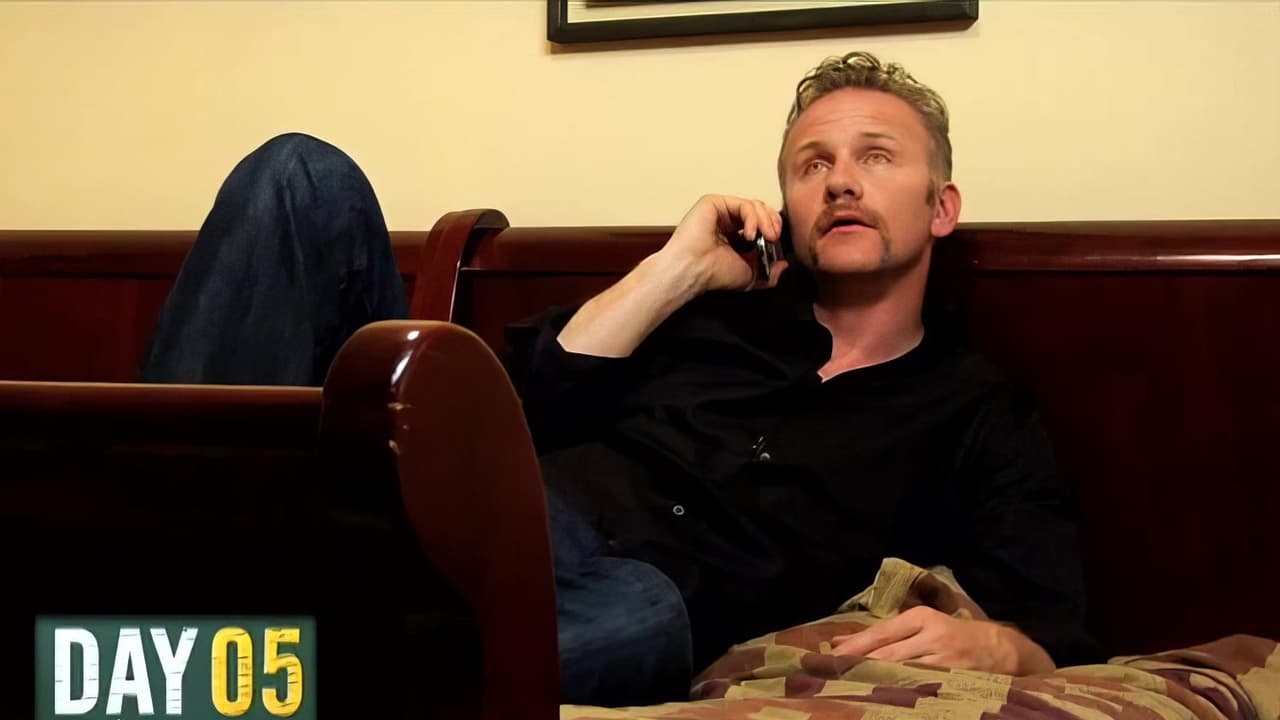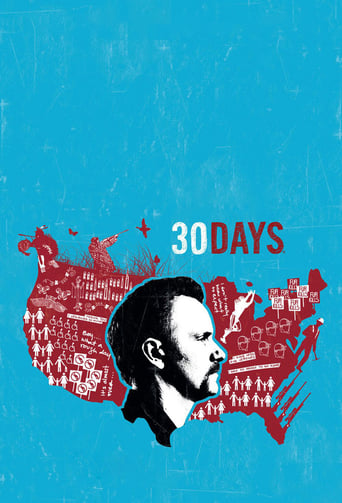Smartorhypo
Highly Overrated But Still Good
Tedfoldol
everything you have heard about this movie is true.
CrawlerChunky
In truth, there is barely enough story here to make a film.
Keira Brennan
The movie is made so realistic it has a lot of that WoW feeling at the right moments and never tooo over the top. the suspense is done so well and the emotion is felt. Very well put together with the music and all.
bvsc0100
When Morgan explains the differences between Judaism, Christianity and Islam, he really gets Judaism wrong. I understand that he was making a quick and, admittedly flippant, contrast for the purposes of the show. However, he describes the Jews as believing in one true God and "still waiting for His son, the messiah, to save them." "Mainstream" Judaism does not believe in the messiah being the son of God, but rather descended from King David. The Jewish messiah is to be a leader and herald in a time of return to Israel for all Jews and other specific criteria, none of which are divine powers. Another problem with Morgan's statement is that Jews are not waiting to be saved. Salvation or being saved is a Christian belief. Jews do not believe there is a need to be saved in the way Christians believe. There are many responsibilities and burdens we carry in this world, but, for a Jew, Salvation is not one of them. Please notes that when I says Jews believe or do not believe, I am referring the Jewish belief system that most practicing Jews follow. Obviously individuals have their own ideas.
Michael DeZubiria
Given the sheer brilliance and immediate importance of Super Size Me, I was eager to see Morgan Spurlock's next project, the unscripted documentary series "30 Days." Within a few minutes into the first episode, it becomes clear that he is going to use the same structure as he used in his feature documentary, but it also becomes clear that there are a great many subjects and issues in the country and in the world that could use the old Spurlock treatment, if not to solve them, to at least call people's attention to them.In that way, I would say that the series is already a success. Sadly, I doubt his documentary (or even the far superior book - and upcoming, almost surely inferior movie - Fast Food Nation) has had the impact that he had hoped for and America (and our health) really need, but it is certainly a step in the right direction.The basis of this series is that each week someone is taken out of their daily lives and placed into the lives of someone else, someone either polarly different from them, or who leads a lifestyle that is morally, politically, religiously, or some way abhorrent or unacceptable for whatever reason.The Binge Drinking Mom, for example, was abhorred by her daughter's kamikaze-style partying, as was the straight guy by all of the gays that he was surrounded by for a month, and the Christian found himself unwilling and unable to follow many of the customs of the Muslims with whom he lived in his episode. Many of the episodes are astonishing in their ability to illuminate the plight of some of the people in this country, such as the first episode, about our nation's ridiculous minimum wage, as well as to really change and heal uninformed and prejudicial feelings and beliefs, such as the episode where the straight man lives with a gay man for a month. There are true differences and real friendships made, not some contrived piece of claptrap staged for the passing cameras.Then again, some episodes reveal something of a lack of ideas, or at least a failed experiment. The Binge Drinking Mom episode, for example, is stunning in its pointlessness and absurdity, almost as if it belonged in a different series. There is absolutely no sense of realism or positive change anywhere in the episode. If anything, it is the mother whose weakness should be focused on, given the pathetically wan behavior she exhibits when confronted with her daughter's belligerent behavior. She hangs her head in submission as her daughter puts her hand in her face to shut her up about her partying as she answers her ringing cell phone and complains to one of her friends about her pain-in-the-ass mom.Had mom calmly reached over (as mine surely would have done), taken the phone out of her daughter's hand, snapped it in half and laid the pieces onto the table, and then laid down the law, she would have gotten her daughter's attention, at least for the remainder of the time that they spent at the table. Instead, the mother's ensuing drinking experiment comes off as a tired plea of desperation which neither the daughter nor the audience can ever take seriously.Nevertheless, the series as a whole has a lot of good points to make about everything from drinking to religion to sexual orientation, and it is lucky in that it has a pretty open-ended premise. As long as there are problems in America, theoretically it could go on forever. Although given the problem of the diminishing American attention span, much of America, myself included (although not for lack of interest), may soon be on the lookout for what Morgan's got up his other sleeve.
bottlekid
I have only seen the minimum wage episode yet i have no intention of watching the others, how can that be? Morgan starts theatrically complaining about his awful situation living on minimum wage right at the beginning of the episode and the complaining never stops. Ever. Luckily for the viewer, his skinny girlfriend is just as annoying as Morgan (if not even more annoying).And then to top it all, they go to the movies and buy bottled water for 2,50 and after that go to a restaurant to eat out all the while they naturally *drumroll* complain about being poor.I don't care if the other episodes may or may not be better than this. No one should be forced to watch this crap.
liquidcelluloid-1
Network: FX; Genre: Documentary, Reality; Content Rating: TV-PG - MA (occasionally strong language); Perspective: Contemporary (star range: 1 - 4); Season Reviewed: 2 seasons At this point, after "The Shield", "Nip/Tuck" and "Rescue Me", I am putty in the palm of FX's hand. HBO and Showtime - look out. This is the network that is poised to become the new home of quality television. "30 Days" is the network's first step away from scripted dramas and it is a generally successful addition to the line-up.Created and hosted by Morgan Spurlock, this reality series and something of a spin-off from his entertaining, well made obesity exploration documentary "Super-Size Me". Each week Spurlock finds somebody who is willing to immerse themselves in someone else's life for 30 days - somebody who, like the ABC British remake "Wife Swap", is their polar opposite or is someone the media has told us that person should dislike. A Christian lives as a Muslim, a Christian lives as a gay man, gas-guzzling SUV lovers live off the grid and a man who lost his job to outsourcing takes takes one in India. See the pattern here? Even when we do meet an atheist, who wants "God" taken out of the pledge, living with a peaceful religious family (did Spurlock read my season 1 review?), the show flips its formula around and takes her side. We didn't need to see Spurlock's ACLU card to know where he stands.But like in "Super-Size Me", Spurlock is fair and he doesn't look down on the participants or lecture to us too horribly. He comes off like more of an "awe shucks" inquisitor then a pit-bull hell bent on proving a hypothesis. Even his human subjects are sympathetic, if only because of how hard they are trying to make this unenviable situation work. That fairness and authenticity makes "30 Days" almost indistinguishably from every other "reality" show. It isn't trying to put something over on us or humiliate the participants. That is refreshing - which is quite the commentary on the state of reality TV.The effect Spurlock's perspective does have on the show is that many of the experiments really only make sense in a vacuum. There is no explanation as to why people are on minimum wage or why Americans believe what they do about Islam, just that it happens and we need to fix it somehow. All episodes end with the same bleeding-heart message of tolerance and diversity and the two opposites becoming close friends - which is predictable. I'm not asking for "balance" here, just a little more imagination in the topics.In the best episodes, the experiments put us into a squeamish fear for the health of the subjects - such as "Outsourcing", "Binge Drinking Mom" and the best, "Minimum Wage" where Spurlock and his fiancé, Alex, themselves hit the streets of Detroit in what becomes a real trial for survival. "Minimum Wage" is exceptional TV. It was my hope that the rest of the season could match its intensity. But in the 2nd episode, an experiment to debunk hormone therapy, the concept is changed up all together and becomes more like "Penn & Teller: Bullshit".With many of the results predictable, "Days" isn't about how it ends,but about the process - and actually getting to see how this life change slowly effects people is a quite a bit of fun. It is here when the show makes the same fundamental mistake that every other reality show does. As exceptional as the packaging is, the fact remains: real people aren't very interesting. The participants are admirable in their guts and Spurlock finds fairly interesting people to go through this, but even they are unable to carry the show for the whole hour.Fortunately, Spurlock has planned for this. He uses the old documentary stand-by of animated sequences to move through quick educational vignettes and history lessons. Nothing profound, but they are informative enough to get everybody up to speed. Spurlock himself also pops up intermittently amid the experiments to do little experiments of his own, like going down to Mexico and trying to buy his own HGH or interviewing a parent whose daughter was killed by a drunk driver. The show comes back to life when Spurlock, or his fiancé (a game gal if there ever was one), appear back on the screen. Spurlock is a great host/tour guide: energetic, creative, funny, clever - all the things Michael Moore isn't. He pokes fun at his own mustache in the single funniest line of the season."30 Days" should be taken with a grain of salt and has clearly been sanitized for our politically correct protection (his depiction of media sacred cows as the gay man and the American Muslim is strictly by the book), it achieves what is no doubt the goal - to spark debate and discussion at home or at work and have a little fun in the process.The show is restrained emotionally. On one hand it never degrades into sap, on the other hand Spurlock doesn't go full force and give us an emotional punch in the face some stories probably need. On the other hand it isn't manipulative. This is a slight show, but Spurlock makes it work. Plug it back into the reality/documentary genre it belongs in and it looks even better. I hope the show returns and would like to see Spurlock given the chance to really get creative with the experiments. Twist the knife a bit. The potential is there for a great product.* * * /4

